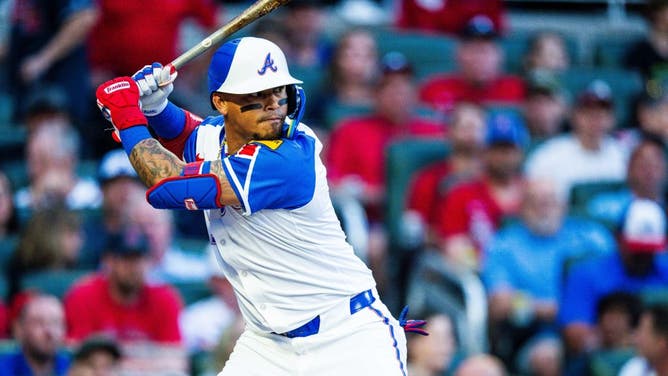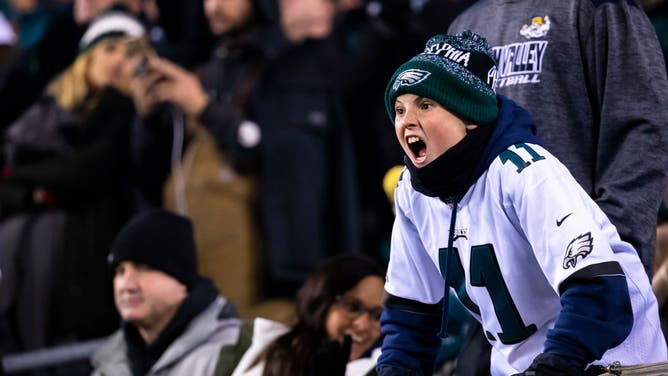Streaming Sucks For Sports Fans, Here Are 3 Ways To Fix It | Clay Travis
On April 9, the Braves were playing the Mets in an early season rivalry matchup and my three boys all wanted to watch the game.
Only the game wasn't available on television when we tried to put it on -- Bally's Sports, which covers the Braves games here in Nashville because we are considered to be in the Braves' viewing area - had the Nashville Predators and the Memphis Grizzlies on television on its two sports networks.
So the Braves weren't on our Comcast cable package.
But the game was also listed as being available on ESPN+ and on the MLB app.
So we tracked down the knower of all streaming passwords in the Travis household -- mom -- got what she thought was the right password for both, put in said passwords and held our breaths hoping they were correct -- celebrated when the passwords actually worked! -- only for both sites to immediately black out the game when they logged us in.
Why?
Because we were in the local viewing footprint and were supposed to be able to watch on Bally's, which wasn't offering the game.
So we weren't able to watch the game on TV, on ESPN+ or MLB Extra Innings.
Despite paying for all three services.
At least not legally. (The younger you are, the better you probably are at finding pirated game feeds online.)
Streaming options cause frustrations for fans with blackouts
This sort of frustration happens several times a year for us here in Nashville, but when I Tweeted about my family's frustration of trying to put on the Braves game, the responses were legion. Many of you have experienced similar frustrations with streaming related issues and blackouts in your own hometowns.
Many of you suggested illegal streams and registering a new VPN to show us as another geographic location, but requiring fans to commit crimes to watch games is, frankly, a demonstration of just how failed the modern viewing experience has become in the streaming era. (The fact that so many fans are willing to commit crimes to watch games shows just how embedded the frustration has become.)
Because the truth is this: sports blackouts are getting worse, not better, in the streaming era.
It's 2024 - watching sports shouldn't be so hard for fans
No matter which team you root for, you've probably struggled with this issue where you live as well.
Watching your favorite team play is becoming more expensive, less convenient, and more frustrating than it was just a few years ago, that's an awful trilogy of failure.
The frustration is enough to make you yearn for the days of my youth when I spent many a summer night -- and a summer day -- simply flipping on WTBS, channel 23 in Nashville, to watch the Braves or WGN, channel 20 in Nashville, to watch the Cubs. (My bet is many of you, especially those of you around my own age, remember those long, pre-Internet, summer days with a great deal of nostalgia. Hell, I still remember those television channel numbers as well as I remember my best friends numbers from when we were in high school. I can't tell you anyone's number today. Or any TV channel if the channel isn't the same as it was in 1990.)
These modern day sports blackouts, brought on by a new streaming era, are also a return to the earlier days of my youth, back when you had to listen to some games, yes, this was the real world, on a scratchy radio reception or even, yes, this was the real world too, wait until the next day's newspaper to see who won a game.
Read: It's Your Fault The NFL Will Continue To Stream Games Exclusively on Peacock, Amazon, Etc.
At a time when technology has never been more omnipresent and ease of transmission has never been cheaper and more reliable, why are we going backwards when it comes to watching our favorite teams play? And why are leagues allowing it to happen? In an era when getting kids to care about sports is often impossible -- youth game watching rates are at abysmal levels -- why are sports leagues giving up the future to make a few extra dollars in the short term?
Sports leagues, in the year of our lord 2024, are actually making it far more difficult for fans to watch their games than they have been for a generation.
I don't know who is advising these sports leagues on this -- I suspect it's corporate bean counters with no actual knowledge of sports fandom -- but it's long past time for a sports fan's bill of rights.
All of us are paying massive amounts of money in a streaming era for much less quality of viewership experience.
And many of you, like me, are fed up with it.
I have several ideas, but I've boiled it down to three essential truths.
Sports fan Bill of Rights for streaming services
1. No more sports blackouts.
Ever.
In the 1950's, as televised sports became commonplace, blackouts were instituted as a way to ensure fans still bought tickets to games.
The fear was that if you put a game on TV, fans simply wouldn't go to the game. That might have made sense in the 1950's, but it makes no sense today.
More significantly, the concept of blackouts has expanded massively to now include not just seat selling seat concerns in local cities, but also who has the "rights" in a particular viewing area. Some of you are blacked out for multiple teams in the same city, often hundreds of miles from the team's location. How is that even possible?
I live in Nashville.
No one in this city is deciding to go to a Braves game or not based on whether the game is available on TV or not. The entire blackout concept is nonsensical in the modern era.

I should be able to watch an Atlanta Braves game whenever and wherever I want to. (Photo by Kevin D. Liles/Atlanta Braves/Getty Images)
I believe there is a huge antitrust lawsuit that should be filed to attack these modern day blackouts. In my above example from April 9, I'm paying for a cable service and a game, the Braves vs. Mets, that I didn't receive in my cable package. Why shouldn't I be able to sue for this failure? And why shouldn't it be a class action involving millions of fans who have had something similar happen because of blackouts?
I think a major lawsuit is what it's going to take to end blackouts forever.
And I'm happy to put my name on it if a big antitrust law firm wants to file the suit.
2. Institute fan golden tickets.
Here's the simple answer to all this mess: there should be one price I can pay that guarantees me every game for a team that I want to watch.
Period.
It should be the default, 100% guaranteed way to watch a game and there should never be any blackouts on that location.
If my family wants to watch one of the 162 Braves games, one of the 82 NBA or NHL games, one of the 17 NFL games or one of my favorite college team's games, I want to buy a golden ticket that guarantees me the game will always be on at that location. I don't care who the announcer is or who the broadcasters are, I just want to know I can watch without fear of any blackout.
Last night we tried to watch the Braves play the Rangers and it was only available on Apple +. That should never happen.
I should be able to watch no matter what on my season pass.
Frankly, the teams are allowing their fans to be super aggravated by not having a direct relationship with them themselves. I'm a fan of the Braves, rather than a middleman controlling their games, I'd like to pay the team directly for their games.
Heck, the team could even include a few tickets for actual games as a part of my season pass purchase. That way you're making it easier for me to see the games and you're also encouraging me to make the trip to see the games in person too.
I'm fine with national games airing on other networks -- that's one way to grow the audience -- but most baseball fans are fans of individual teams, not the larger league itself. Just give me a golden ticket so my games are always viewable.
But it's not just individual teams, in fact, and this is the real killer business deal, I want to be able to buy a golden ticket to watch any game from any league at any point in time.
WITH NO BLACKOUTS EVER!

The joy of watching sports should not be hindered by the nightmare of streaming services. (C) Getty Images
And I don't want to need a billion passwords to do it and I don't want to subscribe to a million streaming services, which are virtually impossible to switch rapidly between.
I want one pass and I want every game.
Kind of like, you know, cable was in 2014.
I don't want to sound like an old man, even though I understand that I am sounding like an old man, but it wasn't very long ago that I could sit down on my couch with ONE FREAKING REMOTE CONTROL and find any sporting event I wanted to watch.
Sports leagues need to understand that in an effort to squeeze every dollar out of fans, they are burdening their fan's wallets and driving them bonkers. We're all paying more and getting less.
That's a recipe for disaster.
3. Invest in building a new generation of fans.
I want to pull my hair out when I see some of the decisions being made that make it harder to grow new sports fans.
The UConn-Purdue men's title game started at 9:20 eastern on a Monday night.
How many young kids on the east coast were able to stay up to watch this entire game? Not many.
Heck, many young fans WERE IN BED BEFORE THE GAME EVEN STARTED.
What sense does this make for anyone trying to grow the audience for men's basketball?
I'll tell you, zero.
There should be an executive in every league -- and with every team -- whose entire job is focused on fans under the age of 14. And that executive should have veto power. One reason baseball doesn't have a national fan base? The World Series games start way too late.
Especially given how many people work from home now, START THE GAMES WAY EARLIER!
Leagues need to spend more time worried about the next generation and less time worrying about the extra nickel they're squeezing out of their broadcast rights. Because what's the value of a nickel if you lose a generation in the process?
Eventually the cost gets realized.
You're just passing the cost down to the next generation.
If I owned a team -- or managed a league -- all I would care about is the next generation of fans. You've got the adults already, they'll spend their money with you for the rest of their lives, but how many young people do you have? That's even more important because when I grew up there were far fewer entertainment options.

Sports leagues to be mindful of how to make their product appealing to the next generation of fans. (Photo by Brett Carlsen/Getty Images) *** Local Caption ***
It feels to me like most of these leagues have zero strategy for actually growing young fans. (Something other, by the way, than posting a highlight video on social media.) I'm talking about building fans who want to go to actual games in person.
That should be the sole focus of much of their thought today.
And, by the way, don't even get me started on the cost of going to games. Most average families can't afford to attend games. I'm blown away by what concessions cost inside a stadium, completely blown away by it.
I have money to pay for tickets today, but when I was a kid, we almost always got tickets in the upper deck and tried to sneak down to better seats. We'd spend several innings scanning sections with open seats, trying to figure out which ushers weren't very aggressive about their jobs. I've spent entire games worried that rich people who couldn't bother to get to the game when it started were going to get us busted by showing up in the fifth inning and making us move. I should probably write an entire article on the cost of games, but suffice it to say I'm just focused, for the most part, on being able to watch games at home for a reasonable price.
...
Watching sports brings famalies together, builds fans
It's kind of a miracle that I'm a big baseball fan again.
That as I write this article I'm planning on watching the Braves play the Rangers with my kids.
It's even more unlikely that it was my kids who made me a baseball fan again.
Over the past five years or so it's become a Travis family tradition that we put Braves games on pretty much every night. This all started back in 2019 when my middle son started watching Braves games by himself on television and then accelerated during 2020 when there weren't many sports on because the covid idiots were demanding the country be locked down. So we'd watch the Braves every night during that crazy sixty game season.
In fact, my middle son had one request for his tenth birthday back in 2020; he wanted to watch the Braves play from the Omni hotel at the Battery in Atlanta. That year, and I'll never forgive the people who did this to us, no fans were allowed in Truist Park, but you could watch the game in an empty stadium from the hotel rooms looming over the outfield.
So this was how we spent his 10th birthday.
In the process of my boys becoming Braves fans, I became a baseball fan again, something that surprised me because I hadn't really been a big baseball fan since the 1994 player strike happened. I was 15 years old then and when baseball quit on the season -- I was with my dad at the final Cincinnati Reds game before the strike that year -- I got busier with life and I never really came back to baseball.
Until my own kids brought me back.
To the point that I'd now consider myself, like much of the South, a big Atlanta Braves fan.
I suspect that's a rarity, kids bringing their parents back to sports fandom, but regardless of how people become fans, allowing them to watch the games with ease should be the paramount goal of every league and team.
And right now the leagues and teams are failing.
We're all paying much more and getting much less in a streaming era.
So far streaming has been a disaster for sports fans.
But it doesn't have to be that way.
It's well past time for that to be rectified, steering leagues toward my three ideas above will go a long way towards bringing in another generation of fans. Sometimes that requires taking a bit less money in the short term to grow a bigger pot of value in the long run.
We'll see if sports leagues are smart enough to make that trade in the years to come.
Because right now, they haven't been.
Here's hoping that changes.